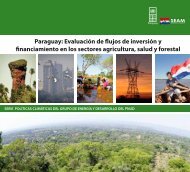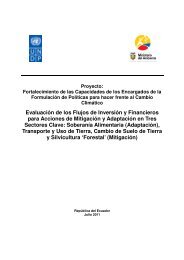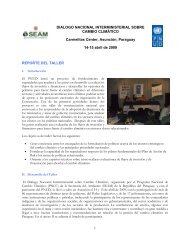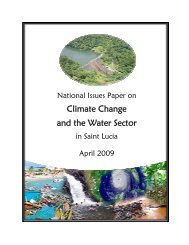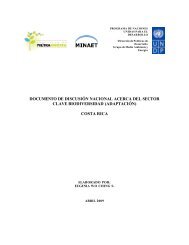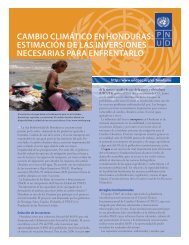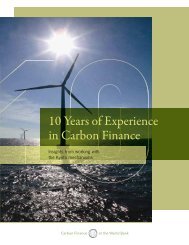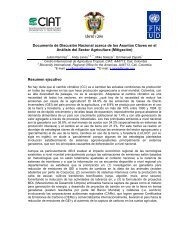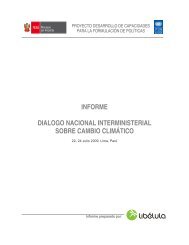national climate change awareness-raising workshop - UNDPCC.org
national climate change awareness-raising workshop - UNDPCC.org
national climate change awareness-raising workshop - UNDPCC.org
Create successful ePaper yourself
Turn your PDF publications into a flip-book with our unique Google optimized e-Paper software.
Reforms may be needed to allow for power inputs from independent suppliers. Demand side<br />
management and energy efficiency can only be achieved when appropriate regulations are in place;<br />
• Promoting renewable energy sources, including through tax incentives to lower to costs. Renewables<br />
such as wind, small hydro and geothermal could hold great potential for Namibia, as well as making<br />
it less dependent on imports from neighbouring countries;<br />
• Setting <strong>national</strong> standards in specific sectors, especially the transport sector with emission standard;<br />
• Setting <strong>national</strong> energy targets;<br />
• Fuel switching in the energy sector, such as to clean coal and/or natural gas, as well as fuel switching<br />
in the transport sector;<br />
• Possible <strong>change</strong>s in the land-use sector;<br />
• Improved building regulations;<br />
• Energy recovery and other mining improvements.<br />
There are also sector-specific actions for mitigation, such as improving pumping systems in the water sector,<br />
and promoting different species of plants in the agriculture sector. Other possibilities include:<br />
• Rural electrification: Introduction of appropriate technologies, including solar cookers.<br />
• Appropriate farming systems: In Namibia, farming is mostly done on woodlands in far northeast. It<br />
would be better to have more intensive farming, than to move onto marginal (less productive) lands.<br />
• Sustainable forest management through communities. For example, bee keeping could be a livelihood<br />
component of sustainable forest management.<br />
Some mitigation options are linked to adaptation, such as improvements to mining, which is highly “water<br />
sensitive”. Participants also stressed that public <strong>awareness</strong> is most important at this time–so that people<br />
understand why they should take action. This needs to be top down (policy makers) as well as bottom up<br />
(consumers), e.g. wood harvesting–cut down dead trees, not live trees (which are sinks).<br />
Is it realistic to expect that sufficient mitigation technologies will be developed and diffused, especially in the energy sector, even if<br />
there is no carbon cap<br />
Participants were divided on the issue. Some agreed that a <strong>national</strong> goal of some kind was needed or<br />
“business as usual” would simply continue. Others, however, said this was not needed, as some mitigation<br />
actions are already underway, such as with solar power. ESCOM in South Africa is replacing more efficient<br />
machines under demand-side management, which has already has ramifications in Namibia in the mining<br />
sector, where they are updating machines to be more efficient.<br />
Which measures do you consider as most appropriate or desirable for Namibia: Kyoto-style fixed targets, per capita entitlements,<br />
the Brazilian Proposal, SD-PAMs, CDM, etc<br />
Under the inter<strong>national</strong> sectors, some participants supported the “sustainable development policies and<br />
measures” (SD PAMs) approach, but noted that implementation would give rise to questions of how they<br />
could be “measurable, reportable and verifiable” as required under the Bali Action Plan. Any SD PAMs<br />
3




